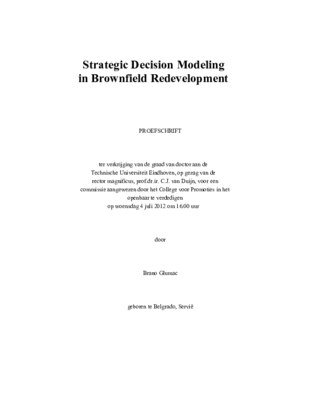"Several important changes have recently influenced urban planning and the process of redevelopment. At first, the scope and scale of urban redevelopment projects has increased. Secondly, a traditional linear planning process from government to the building industries has been replaced by public-private collaborations that changed the characteristics of the developer and governmental bodies. These actors now have a major influence in urban development processes. Therefore, an important cause for stagnation in redevelopment of brownfield is the lack of consensus amongst key actors due to shared, overlapping concerns or individual conflicting interests. The objective of this research is to analyze the actors’ interaction in brownfield redevelopment processes and to offer recommendations concerning the optimal agreement in public-private partnership for these redevelopments. The data is generated for the purpose of research. Therefore, the two on-line surveys were conducted. In both cases, the respondents were the experts from the branch of urban development. The research framework focuses at: (1) the attributes of a brownfield; (2) the preferences of actor’s groups; (3) the characteristics in the negotiation processes, regarding the two groups of actors. Several research methods are used. First, in order to structure and prioritize the influential attributes a fuzzy Delphi method is used. Then, the stated choice experiments provide an insight in the individual preferences of actor groups. Consequently, the utility functions for public and private parties were created. These utilities are used both as an input for the game in game- theoretic environment and as a part of the finial application regarded as prescriptive interactive decision-making approach. The outcomes of the decision-making process are not only depending on an individual choice made, but also include the influence of the choices of an actor’s opponent. Therefore, the focus is specifically on the games (game theory) aiming on finding possible strategies in negotiations for brownfield redevelopments. Conclusions that derive from the game theory analysis will be used as a calibration to improve a prescriptive model.
Little work has been done to develop the models that systematically relate the characteristics of a brownfield area to the behavior of actors, thereby giving an insight in the most important points of interest. The research implications are based upon previously mentioned methodology, thus the interaction between the selected actors is analyzed. In general, the outcomes of this research project will support decision makers to find an optimal deal in the negotiation concerning redevelopment challenge for a brownfield."
